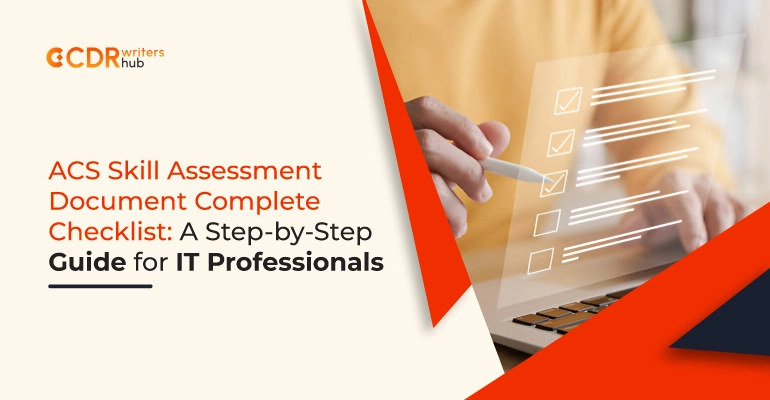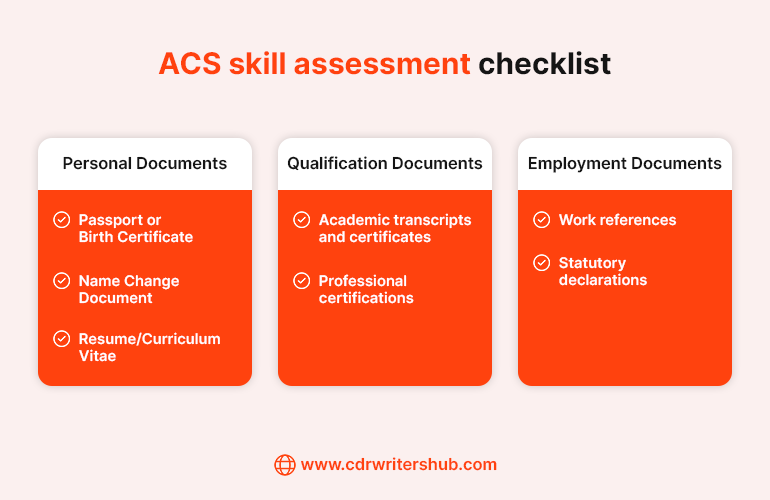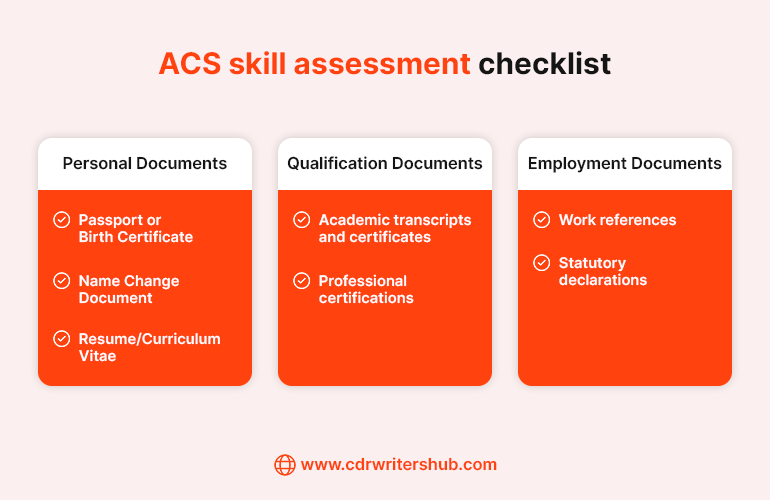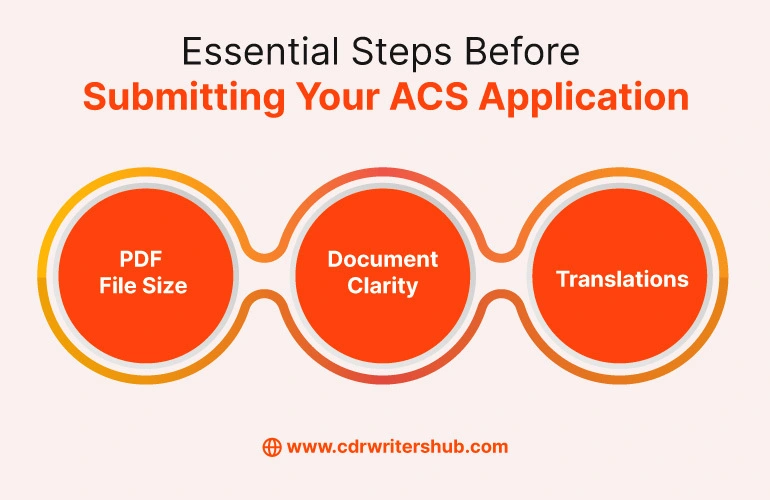ACS Skill Assessment Document Complete Checklist: A Step-by-Step Guide for IT Professionals

ACS Skill Assessment Document Complete Checklist: A Step-by-Step Guide for IT Professionals
Are you planning to migrate to Australia as an IT professional in 2024? The ACS skill assessment is essential to demonstrate that your skills and qualifications align with Australian standards.
The Australian Computer Society (ACS) assesses the qualifications and work experience of professionals in the ICT (Information and Communication Technology) sector to ensure they meet the requirements for migration under skilled visas.
In today’s fast-evolving digital landscape, Australia has become a highly desirable destination for skilled ICT (Information and Communication Technology) professionals worldwide.
As an IT expert planning to migrate to Australia, completing the ACS skill assessment is one of the most important steps. The Australian Computer Society (ACS) evaluates whether your skills and qualifications meet the standards for working in Australia’s ICT industry.
This comprehensive guide will help you understand the ACS skill assessment process, provide a complete documentation checklist, and explore essential elements like ANZSCO codes, Engineers Australia skills assessment validity, and more.
🔑 Key Highlight
- ACS Skill Assessment: IT professionals need to pass this assessment to demonstrate their qualifications and work experience align with Australian standards for migration.
- Document Checklist: Includes personal documents, qualification certificates, and employment references. Correct ANZSCO code selection is critical for a successful outcome.
- Assessment Validity: The ACS skill assessment is valid for 24 months, and applicants must submit their visa applications within this period.
What is the ACS Skill Assessment?
Table of Contents
The ACS skill assessment is a migration skills assessment designed for IT professionals who want to move to Australia. This assessment determines whether your skills, education, and work experience meet the criteria needed to work in Australia’s ICT industry.
The ACS skill assessment is a vital component for ICT professionals who wish to migrate to Australia through skilled visa pathways like the 189 (Skilled Independent Visa), 190 (Skilled Nominated Visa), or 491 (Skilled Regional Visa). The Australian Computer Society (ACS) assesses your educational qualifications and professional experience to ensure they align with Australian standards.
Unlike traditional assessments, the ACS skill assessment is not one-size-fits-all. It is tailored based on your chosen ANZSCO code and the type of qualifications and experience you present. The ACS will compare your profile to the requirements needed to work in Australia’s IT sector, and only those who meet or exceed the standards will pass the assessment.
For individuals lacking formal ICT qualifications but possessing extensive professional experience in the field, the ACS offers the Recognition of Prior Learning (RPL) pathway. This allows professionals to demonstrate their skills through practical work experience.
Why is the ACS Skill Assessment Important?
The ACS ensures that IT professionals possess the necessary expertise to contribute to Australia’s growing tech industry. By undergoing the ACS Australia assessment, applicants can demonstrate their readiness to migrate and work in Australia.
A positive ACS skill assessment outcome is a significant requirement for skilled migration applications, ensuring that only qualified professionals are considered for roles in the Australian ICT sector.
Understanding the ANZSCO Code
The ANZSCO (Australian and New Zealand Standard Classification of Occupations) code plays a crucial role in the ACS skill assessment process. It is a code that classifies job roles and specifies the skills required for each profession.
Selecting the right ANZSCO code is vital for your ACS assessment, as it directly influences how your qualifications and work experience will be evaluated. The code must accurately reflect your job role and experience.
For example, an applicant working as a data analyst might choose the ANZSCO code 261111 (ICT Business Analyst) or 261311 (Analyst Programmer), depending on their duties.
The ANZSCO code provides a framework for ACS to evaluate your education and professional experience based on Australian standards. If your job description doesn’t closely match the code selected, it may lead to a negative assessment outcome.
Tips for Choosing the Correct ANZSCO Code
- Carefully review your job descriptions and match them with the relevant ANZSCO codes.
- Ensure that your chosen code aligns with your qualifications and experience.
- Provide supporting documents, such as work references, that validate your role under the selected ANZSCO code.
How do I apply for the ACS Skill Assessment?

Once you’ve selected your ANZSCO code, it’s time to apply for your ACS skill assessment. Follow these steps to ensure you meet all requirements:
Step 1: Review the ACS requirements
Before you begin your application, it’s crucial to familiarize yourself with the requirements laid out by the ACS. This includes specific eligibility criteria based on your education and work experience.
You can find detailed guidelines on the ACS website that outline the minimum qualifications and documents required for each application type.
Step 2: Choose the right ACS application type
There are several types of ACS assessments, and choosing the correct one is key to ensuring your application is processed efficiently. Some of the common ACS application types include:
- Temporary Graduate (TG): For recent graduates from Australian educational institutions.
- Post Australian Study (PAS): For individuals who have completed their studies in Australia and have work experience in the ICT sector.
- Recognition of Prior Learning (RPL): For applicants without formal ICT qualifications but with extensive work experience in the field.
- Skills Assessment for Migration: For individuals with international qualifications and experience seeking skilled migration.
Step 3: Gather the required documents
Next, prepare your documentation in line with the ACS skill assessment checklist. Submitting complete and accurate documents will increase your chances of a successful application.
ACS skill assessment checklist

Here is a detailed ACS skill assessment checklist to guide you through the process:
Personal Documents
- Passport or Birth Certificate: A clear color scan of your passport or birth certificate is required. Ensure that the identification page showing your name, date of birth, and other personal details is visible.
- Name Change Document: If your name has changed, provide a color copy of the official document that proves the change.
- Resume/Curriculum Vitae: Prepare a professional resume outlining your work history, educational background, and any relevant certifications.
Qualification Documents
- Academic transcripts and certificates: Submit color scans of your degrees, diplomas, and transcripts. These should include the following details:
- Title of your degree
- Name of the university or educational institution
- Date of completion
- A detailed breakdown of the subjects studied and the grades earned
- Professional certifications: If applicable, provide documentation for any professional certifications (e.g., Microsoft) you have obtained. You may also need to submit login credentials for the certification authority for verification.
Employment Documents
- Work references: Your references should be printed on official company letterhead and must include
- Job title and description
- Start and end dates of your employment
- The duties and responsibilities you performed
- Whether the role was full-time or part-time, along with hours worked per week
- Contact information for the employer or supervisor
- Statutory declarations: In cases where formal references are unavailable, you may submit a statutory declaration signed by a senior colleague. The declaration must be authenticated by a legal authority.
Step 4: Submit Your ACS Application
Once you’ve gathered all the required documents, it’s time to submit your ACS application. The process is straightforward but requires careful attention to detail.
- Create an account on the ACS website
Start by registering on the official ACS Migration Skills Assessment platform. Fill out your details and follow the instructions to create your application.
- Upload the required documents
Upload your documents as a single PDF file, ensuring it is no larger than 3 MB in size. Avoid encryption the file or making it read-only.
- Pay the assessment fee
Pay the assessment fee as specified by the ACS. Keep in mind that fees may vary depending on the type of application you’re submitting.
- Await the outcome
The processing time for ACS skill assessments generally takes 6 to 8 weeks. However, this timeline can vary depending on the complexity of your case and whether any additional documents are requested.
Engineers Australia Booklet and ACS Assessment
For those in the engineering sector, the Engineers Australia booklet is a comprehensive resource that outlines the steps for obtaining a skills assessment. While Engineers Australia handles the assessment of engineers, ICT professionals must complete their migration assessment through the ACS.
Engineers Australia Skills Assessment Validity
The Engineers Australia skills assessment validity typically lasts for 24 months, similar to the ACS skill assessment. This means that once you receive a positive assessment, it remains valid for two years, during which you can lodge your visa application.
For ICT professionals, the ACS assessment also holds a 24-month validity period. It’s crucial to ensure that your skills assessment remains valid throughout the visa application process.
Learn more: 7 Professional Tips for Writing ACS RPL Reports.✨🔥💯
Essential Steps Before Submitting Your ACS Application

Before hitting the “Submit” button on your ACS application, ensure you’ve completed these crucial steps:
1. PDF File Size
Your documents must be uploaded as a single PDF file, with a file size no larger than 3 MB. Ensure the file is not encrypted or in read-only mode.
2. Document Clarity
Submit color scans of your original certificates, transcripts, and other supporting documents. Ensure that all text and images are clear and legible.
3. Translations
If any of your documents are not in English, they must be accompanied by certified translations. Translations within Australia must be done by a NAATI-accredited translator, while translations outside Australia should be certified by a recognized authority.
What to Do if ACS Requests Additional Documents
The ACS may request additional documents if your initial submission is deemed insufficient. If you receive such a request, ensure you provide the necessary documentation within the given timeframe. This step is essential to prevent delays in your assessment process.
How to Handle ACS Skill Assessment Rejections
If your ACS skill assessment is rejected, don’t worry. You have the option to appeal the decision or request a review. This involves providing new or additional evidence to support your application.
Seeking professional help from services like CDR Writers can significantly improve your chances of success. These experts assist with the preparation of documents and ensure your application aligns with ACS standards.
Engineers Australia Skills Assessment Validity and ACS Assessment Validity
One of the most critical aspects of a skills assessment is its validity. Whether you’re applying through ACS or Engineers Australia, it’s essential to know how long your positive assessment will remain valid.
For ACS, the skills assessment validity is 24 months from the date of issue. This means that once you receive a positive result, you must apply for your visa within two years. If your assessment expires before you submit your visa application, you will need to undergo the assessment process again.
Similarly, the Engineers Australia skills assessment validity period is also 24 months. If you’re an engineer planning to migrate, make sure your skills assessment remains valid throughout your visa application process.
Common Challenges and How to Overcome Them
The ACS skill assessment process can be challenging, especially for those unfamiliar with the requirements. Here are a few common challenges applicants face and tips on how to address them:
- Choosing the Correct ANZSCO Code
- One of the most common mistakes is selecting the wrong ANZSCO code. This can lead to a negative assessment outcome if your qualifications and work experience don’t align with the code you selected. Always ensure that your job responsibilities match the chosen ANZSCO code.
- Incomplete Documentation
- Submitting incomplete or incorrect documents can delay your assessment. Make sure to cross-check the ACS skill assessment checklist and gather all necessary documents before submission.
- Work Experience Gaps
- If you have gaps in your work history, be prepared to explain them. Employment references must cover all work periods, so if you have gaps, you may need to provide additional documentation or explanations.
Cost of ACS Skills Assessment
| Assessment Pathway | Assessed on | Application Fee |
| Temporary Graduate 485 | Qualification-only assessment | $600 |
| Post Australian Study | Qualification and experience and ACS Professional Year required | $1,100 |
| General Skills | Qualification and experience require | $1,450 |
| Recognition of Prior Learning | Work experience and a completed RPL form are required | $605 |
| Level 1 Appeal | $500 | |
| Level 2 Appeal | $600 | |
| Global Talent Visa Suitability Assessment | $960 |
Here are the current fees for various additional services related to the skills assessment:
- Fast-track assessment fee: AUD 600
- Separate relevant skilled employment assessment: AUD 440
- Separate overseas engineering PhD assessment: AUD 295
- Separate relevant skilled employment assessment plus overseas engineering PhD assessment: AUD 680
- Review fee: AUD 420
- Standard administration fee: AUD 115
Each ACS skills assessment fee includes up to eight assessment episodes per application. These episodes can be a mix of qualifications and employment documents, provided the total number does not exceed eight. If you submit more than eight documents, an additional fee of $50 will be charged for each extra episode. All fees are in Australian dollars (AUD).
Payment Methods
ACS provides various options for paying assessment fees, such as credit or debit cards and bank transfers. You can easily pay using Visa, MasterCard, or American Express. It is essential to note that ACS fees may vary over time. Make sure to follow the guidelines to ensure smooth processing of your ACS skill assessment.
Fee Waivers and Discounts
In certain cases, such as financial difficulties or sponsorship by an Australian employer, applicants may be eligible for fee waivers or discounts. You can check the ACS website for details on eligibility criteria and how to apply if you believe you qualify for these benefits.
Conclusion
In 2024, the ACS skill assessment remains a critical gateway for ICT professionals aspiring to work and live in Australia. The process may seem complex at first, but with careful preparation, attention to detail, and a thorough understanding of the required documentation and steps, it can be navigated successfully.
This guide has provided you with a detailed overview of each phase, including the essential ANZSCO codes, the ACS skill assessment checklist, and how to select the right pathways based on your qualifications and experience.
Ensuring your documents align with the standards set by ACS Australia will significantly enhance your chances of receiving a positive assessment outcome. Moreover, keeping in mind the specific requirements for qualifications and work experience under your chosen ANZSCO code is critical to avoid delays and rejections.
Beyond ICT professionals, it’s also important to acknowledge that professionals from other fields, such as engineers, will follow a similar migration path but through bodies like Engineers Australia.
Knowing the intricacies of both the Engineers Australia skills assessment validity and ACS validity is essential for planning your migration timeline. Whether applying for a skilled visa today or planning for the future, it’s important to ensure your assessment remains valid throughout your visa application process.
Understanding the nuances of the ACS skill assessment can open doors to a rewarding career in Australia, allowing you to contribute to one of the world’s most dynamic ICT markets.
Staying informed about upcoming changes and assessment guidelines and submitting a complete and well-organized application will go a long way in achieving your migration goals.
For professionals preparing to embark on this journey, consider consulting with migration experts or leveraging resources such as the Engineers Australia booklet or official ACS guides to ensure you are on the right track.
The ACS skill assessment is a key step for ICT professionals seeking to migrate to Australia. With a thorough understanding of the assessment process, the required documents, and the importance of selecting the right ANZSCO code, you can streamline your application process.
Whether you are a seasoned IT professional or just starting, ensuring your documents are prepared according to ACS Australia guidelines will increase your chances of a successful outcome.
With the right preparation, perseverance, and knowledge, the ACS skill assessment can be a smooth stepping stone toward building a prosperous future in Australia.
Frequently Asked Questions (FAQs)
Q1. What documents are needed for the ACS skill assessment?
- Personal documents (passport, name change documents)
- Qualification documents (degree certificates, academic transcripts)
- Employment references or statutory declarations
Q2. How long is the ACS assessment valid?
The ACS assessment is valid for 24 months from the date of issue.
Q3. Can I submit additional documents if ACS requests them?
Yes, if ACS requests additional documents, you must submit them within the specified timeframe to avoid delays.
Q4. How do I translate documents not in English?
Documents must be translated into English by a certified translator. Within Australia, NAATI accreditation is required; for documents outside Australia, a certified translator recognized in the country of origin is necessary.
Q5. How important is choosing the correct ANZSCO code?
Selecting the right ANZSCO code is vital, as it directly influences the assessment of your qualifications and experience by ACS.



